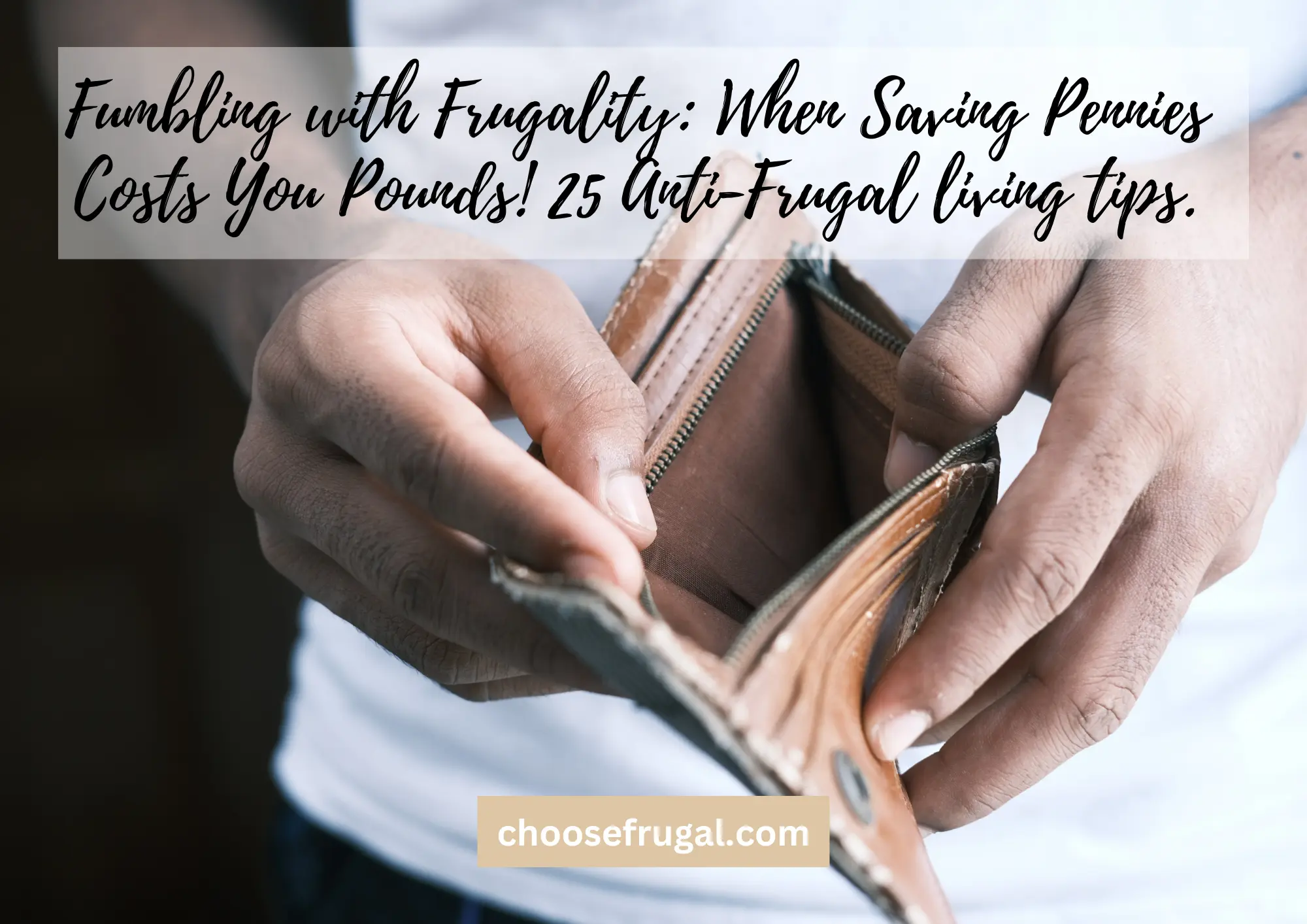
Sure, let’s talk about the 25 frugal habits that might save you pennies but cost you pounds. But remember, this isn’t about demonizing frugality, it’s about choosing the right methods to stretch your hard-earned dollars. Some frugal tips and habits can feel clever at first glance but can have surprising hidden costs. Here we go!
P.S. Want to know when our next post lands and get our free ebook on how to live frugally? Then click the link below.
Sign up here to claim your free ebook!
25 Anti-Frugal living tips

1) DIY Haircuts:
Unless you’re a trained stylist, a home haircut often leads to an emergency salon visit. No one wants to look like they lost a fight with a lawnmower.
2) Extreme Couponing:
Sure, who doesn’t love a good bargain? But the time spent on hunting, clipping, and organizing coupons for things you don’t need is time wasted.
3) Bulk Buying Everything:
200 rolls of toilet paper might be cheap per roll, but are you really saving if half of it goes unused? And the amount of space you need to store it all – it’s like having a roomie in house that doesn’t pay rent!
4) Driving Miles for Cheaper Gas:

Unless you’re driving a tank, the extra miles aren’t worth the pennies saved.
5) Reusing Ziplock Bags:
Washing and reusing Ziplock bags every week can seem cost-effective, but let’s be real. The water and soap usage, plus the time spent, equals… buy new ones.
6) Buying Cheap Shoes:

They might look cute, sell well online and be budget-friendly, but your feet (and future chiropractor bill) might not thank you.
7) Skipping Routine Car Maintenance:
You think you’re saving money until your car breaks down on the highway. Regular check-ups are a car’s best friend!
8) Foraging for Food:
Unless you’re an expert, it’s best to leave mushrooms and berries where you found them. Hospital bills are expensive.
9) Eating Out Less:
Yes, it’s cheaper to cook at home. But if “cooking” means microwaving instant noodles every night, your health will pay the price.
10) Never Using AC or Heating:
A little discomfort can be worth the savings, but turning your home or room into an ice box or sauna is a bit much.
11) Refilling Disposable Water Bottles:
It’s not just unhygienic, it’s a health risk. Invest in a reusable water bottle.
12) Sewing Your Own Clothes:
Unless it’s a hobby, the time, effort, and material cost usually outweigh any potential savings.
13) Skipping Doctor’s Appointments:

An ounce of prevention is worth a pound of cure. Medical bills are definitely not a frugal person’s dream.
14) Making Your Own Cleaning Products:
Sometimes they just don’t clean as well. And if you’re buying a dozen different ingredients, you might not be saving after all.
15) Picking the Cheapest Insurance Plan:
Cheap isn’t always cheerful, especially when you’re hit with high deductibles and less coverage.
16) Not Investing in Quality Electronics:
Buying cheap, off-brand electronics might save you money initially, but they often break sooner and perform worse.
17) Not Tipping at Restaurants:
Penny pinching on gratuity doesn’t just make you unpopular with waitstaff, it’s plain wrong.
18) Ignoring Dental Check-ups:
Dental issues don’t get better with time. Regular check-ups can prevent a small issue from becoming a costly problem.
19) Choosing the Cheapest Contractors:
Remember, you get what you pay for. Cheap work can lead to expensive repairs later on.
20) Keeping Old Appliances to Save Money:
Old appliances often use more energy and could be a safety hazard. Sometimes, upgrading is the more frugal choice.
21) Avoiding Education Expenses:
Free resources are great, but sometimes, investing that cash in your education leads to better job prospects and higher income.
22) Skimping on Groceries:
Buying the cheapest items can mean you eat less nutritious food. Your health is one place you shouldn’t compromise on prices.
23) Freezing Credit Cards (Literally):
It might stop impulse buys, but in an emergency, you don’t want to be waiting in line for it to thaw.
24) Diluting Products to Make Them Last Longer:
More water in your soap won’t make your hands any cleaner!
25) Buying Secondhand Everything:
Pre-loved items can be a great way to save, but things like mattresses, clothing, furniture and helmets are best bought new for safety and hygiene reasons.
The Other Side of Frugality
If you’re feeling dizzy from spinning in the whirlwind of frugal lifestyle, take a break and join us in this refreshingly candid journey of anti-frugal living. We’re here to point out that sometimes, living frugally can cost you more than you think!
You may be subscribing to frugal living tips, setting a strict frugal living budget, and even trying to squeeze your gym membership into a frugal cable or cell phone plan. While this may seem like a surefire way to save, let us paint a different picture.
The High Price of Cheap Laundry Detergent
Remember the time you bought the off-brand laundry detergent to save a few cents? Yep, you ended up doing laundry twice because the clothes just didn’t feel clean. There go your savings, and now you have to go grocery shopping again, fighting for parking at grocery stores, wasting more time and energy. Now, this is one of the classic examples when frugal tips take a toll on your pocket and peace of mind!
Frugality in the Kitchen: A Recipe for Exhaustion?
Now, let’s talk about your frugal living journey that led you to the path of unnecessary money-saving. You started cooking dinner every single night to save big bucks, sticking to meal planning so rigidly that you started to feel like a robot. Sure, it’s cost-effective, but isn’t it making you literally freezing in front of the fridge deciding what to cook next?
Thrift Store Traps: When Saving Costs More
And how about that time you bought clothes from a thrift store? Yes, you saved more money upfront, but remember how quickly they wore out and you had to shop for clothes again? When we talk about money, it’s not just about how much you spend, but also about the value you get for it.
Health Over Frugality: A Wise Choice
It’s high time we debunked the myth that living frugally is the only way to financial freedom. It’s about smart choices. If you save on your grocery bill, but your diet is primarily instant noodles, are you really winning? We’re all for saving, but not at the cost of our health or sanity.
Investment vs. Immediate Savings: The Smart Choice
Don’t get us wrong, we’re not advocating for reckless spending, but for mindful decisions. Like choosing a quality coffee maker that lasts longer instead of going for the cheap option that might break down soon. Or investing in an energy-efficient electric appliance that costs more upfront but saves on your electric bill in the long run.
Enjoy Life Now: The Anti-Frugal Living Mantra
And finally, it’s okay to treat yourself once in a while. Have some fun, make that purchase you’ve been eyeing, enjoy a meal out with friends. You’re not just saving for the future; you’re living now.
The True Meaning of Value for Money
In conclusion, the mantra should be value for money rather than just frugal living. It’s about living smart, not just living cheap. So take that next adventure, enjoy your life, and remember – being a frugal person doesn’t mean you can’t enjoy the better things in life!
Remember, the key to successful frugal living isn’t just about cutting costs, it’s about making smart choices and purchases that won’t cost you more in the long run. Happy saving!
Determining what constitutes a sensible frugal habit versus a nonsensical one comes down to several key factors:

1. Time vs. Money:
A sensible frugal habit saves more than just money; it should save or respect your time too. If a money-saving activity consumes an exorbitant amount of your time, it may not be as cost-effective as you think. Consider the opportunity cost involved. Could you be doing something more productive or enjoyable with that time?
2. Quality vs. Quantity:
If buying something cheap means you’ll need to replace it more often, you might not be saving at all. Sensible frugality understands that sometimes a higher initial cost can mean less expense over time due to better quality and longevity.
3. Immediate Savings vs. Long-Term Costs:
Some habits may save a few bucks upfront, but result in significant expenses down the road. Skimping on health or dental care, for example, can lead to expensive treatments later on.
4. Needs vs. Wants:
Sensible frugality distinguishes between the two. Buying something unnecessary just because it’s on sale isn’t saving money. However, stocking up on sale items you use regularly and would buy at full price later is sensible.
5. Health vs. Savings:
If a frugal habit endangers your health or safety, it’s not worth the few dollars saved. This applies to food, hygiene products, medical care, and anything else related to your wellbeing.
6. Financial Savings vs. Environmental Impact:
Some money-saving habits could be harmful to the environment. A sensible frugal habit would be both cost-saving and eco-friendly.
7. Short-term Sacrifice vs. Long-term Benefit:
Sensible frugality involves making small sacrifices now to reap bigger rewards later. This is the principle behind saving and investing.
8. Happiness Factor:
If a frugal habit makes you miserable to spend less, it might not be worth the trouble. The goal of frugality is to enjoy a comfortable and satisfying life, not to endure needless hardship.
Finally, consider the big picture. How does the habit fit into your overall financial goals and lifestyle? A sensible frugal and shopping habit aligns with your long-term plans and contributes to a better quality of life.
Here are some frequently asked questions about frugal habits:
1) What is the most frugal way to live?
The most frugal way to live is to maximize the value you get from your spending while minimizing waste. This means prioritizing needs over wants, buying quality over quantity, and being creative with resources. Think of it as being a financial environmentalist – recycling your budget, reusing your income, and reducing your expenses. But remember, a life of frugality isn’t about being stingy, it’s about spending wisely to have more of what truly matters.
2) How do you live frugally on a low income?
Living frugally on a low income can be a bit like performing a balancing act while juggling flaming torches – challenging, but not impossible. Start by creating a bare-bones budget, focusing on essentials: housing, food, healthcare, and utilities. Next, find ways to cut costs. This might include meal planning, using public transportation, or negotiating bills. Get creative with entertainment, like having potluck dinners or enjoying free community events. Remember, it’s not about the size of your income, but how you use it that counts.
3) How do I start frugal living?
Jumping into frugal living is a bit like learning to swim – start in the shallow end. Begin by tracking your expenses to see where your money goes. Then, set a realistic budget that accounts for your income and savings goals. Look for ways to reduce unnecessary spending, such as eating out less, cancelling unused subscriptions, and buying used instead of new. Remember, frugality isn’t a one-size-fits-all lifestyle, but a tailored suit designed to fit your unique financial shape.
4) What’s the best example of frugal living?
The best example of frugal living might be “The Thrifty Gourmet” – someone who cooks delicious meals at home instead of dining out. They’re savvy shoppers, always hunting for sales and discounts, yet they don’t compromise on quality. They buy in bulk, but only items they know they’ll use. They cook from scratch, reducing reliance on costly processed foods. They also creatively use leftovers, ensuring nothing goes to waste. It’s frugality meets foodie, demonstrating how you can savor the good life without cooking your budget.
5) What are the best frugal habits to start with?
Frugal habits like budgeting, meal planning, reducing unnecessary subscriptions, and avoiding impulse buying are good places to start.
6) Can being too frugal be harmful?
Yes, being overly frugal can lead to stress, social isolation, and neglecting important aspects of life like health or quality experiences.
7) How can I make sure my frugal habits are actually saving me money?
Keep track of your spending and savings, review your budget regularly, and assess the average long-term value of your habits.
8) How can I be frugal without feeling like I’m missing out?
Focus on value rather than cost, find joy in simple pleasures, and remind yourself of your financial goals and the benefits of achieving them.
9) Is being frugal the same as being cheap?
No matter what, frugality is about maximizing value and minimizing waste, while being cheap might involve sacrificing quality, fairness, or ethical standards to save money.
10) How can I be frugal when my partner or family isn’t?
Communication is key. Discuss your financial goals, demonstrate the benefits of your frugal lifestyle habits, and find a healthy compromise that respects everyone’s values and needs.
11) Can I still have fun and be social while living frugally?
Absolutely! Many enjoyable activities are low-cost or free, and frugality can inspire creativity in socializing and entertainment.
12) How can I teach my children to be frugal?
Involve them in budgeting, teach them the value of money and saving, and set a good example with your kids’ own frugal habits.
13) Do I have to give up my favorite things to be frugal?
Not necessarily. Frugality is about making thoughtful choices, not deprivation. You can find ways to purchase and enjoy your favorite things in a more cost-effective way.
14) How do frugal habits contribute to financial independence?
Frugal habits can help you save more, avoid debt, and accumulate wealth over time, all of which are key to achieving financial independence.
Embracing the Value of Smart Spending
In our quest for frugality, let’s not overlook the most important part of the equation: value. It’s not always about saving every single penny, but about making informed choices that bring us the most bang for our buck and improve our overall quality of life.
Frugality without thought can cost us more in the long run, in terms of time, quality, and even health. So, let’s be mindful spenders, not just frugal ones. Enjoy your money smartly, invest in quality, and remember, while it’s important to prepare for the future, it’s equally crucial to enjoy the present.
Live a life rich in experiences, not just in saved pennies. The aim should be to strike a balance between a frugal life and a fulfilled life. So, don’t be afraid to splurge once in a while and make life’s journey worth every penny!
Also Read
Crafting a Practical Budget: A Comprehensive Guide to Financial Planning
15 Ways To Make Money Writing Online
18 Actionable Steps for Millennials to Build a Strong Financial Future
Best Wedding Reception Order of Events for Your Big Day (4 Steps to Planning)
9 Frugal living tips for 2022 (and Beyond)
15 Ideas For Minimalist Christmas Decorations
Budgets for beginners: A guide to creating and sticking to one
10 Top Tips for Planning a Wedding on a Budget You’ll Love
15 Essential Tips for a Minimalist Kitchen (Even in Compact Spaces)
The 10 Benefits of Living in a Small Minimalist Apartment on a Budget
11 Tips For Cheap Groceries (How To Save Money On Groceries)
P.S. Want to know when our next post lands and get our free ebook on how to live frugally? Then click the link below.